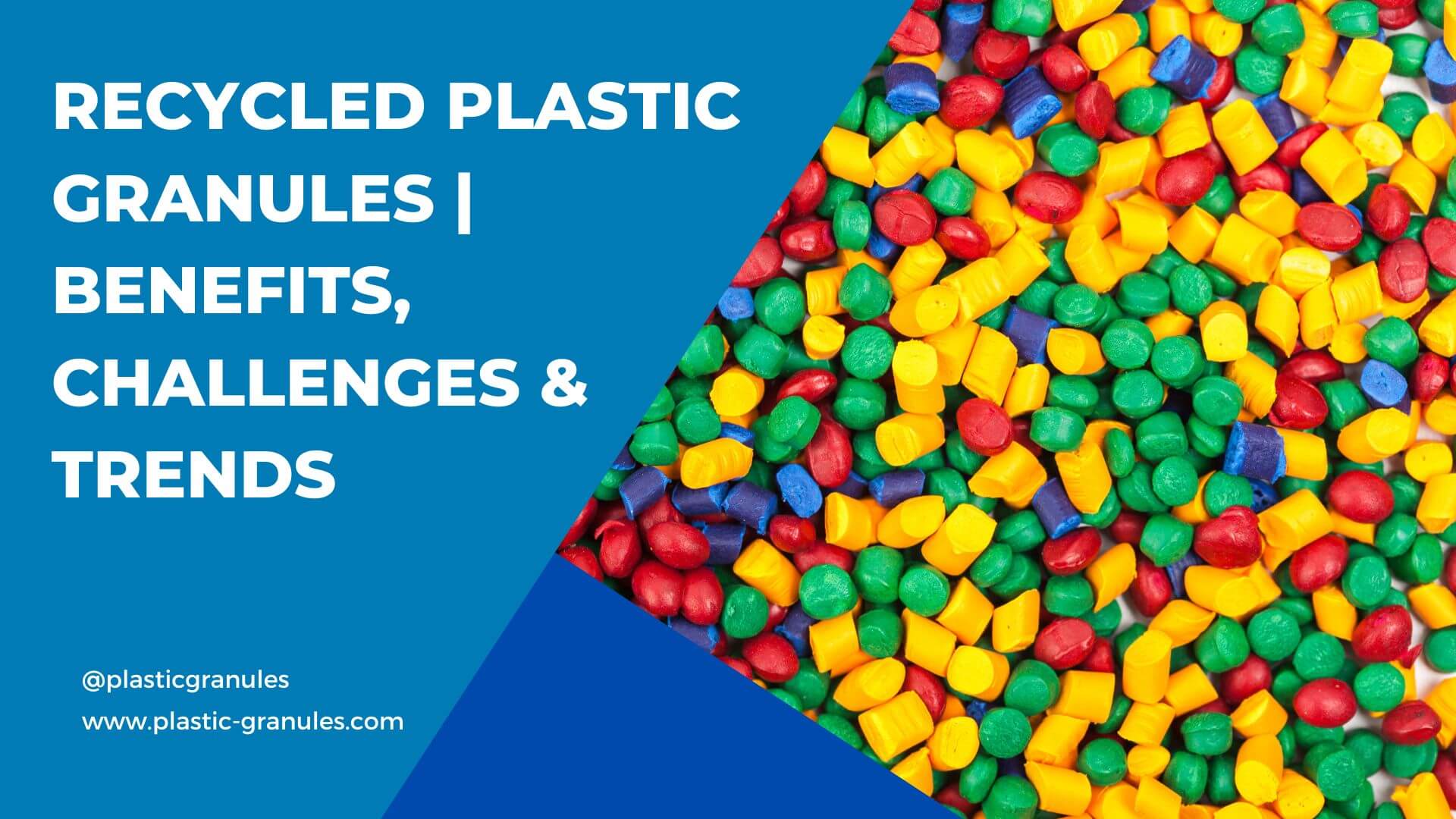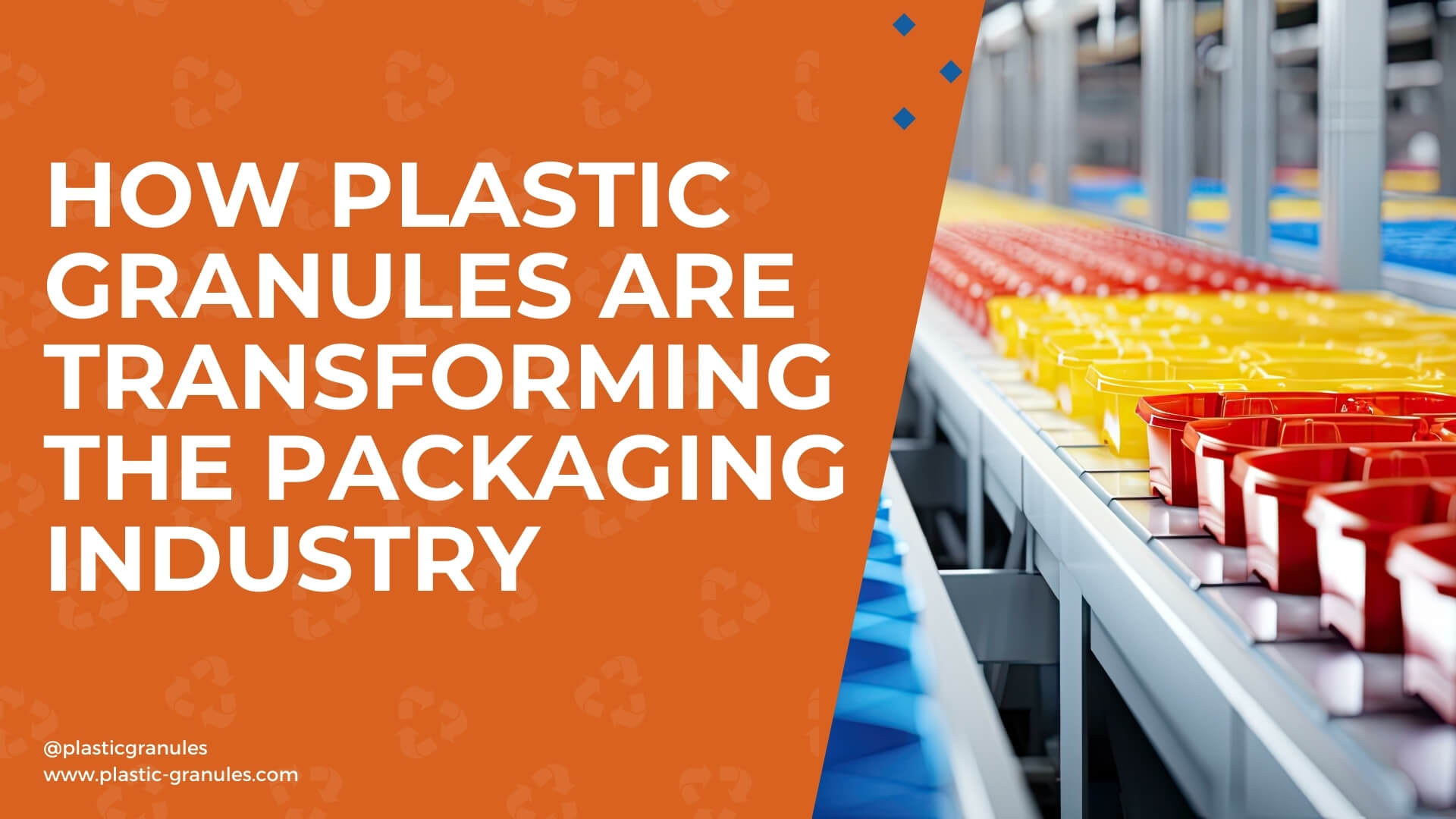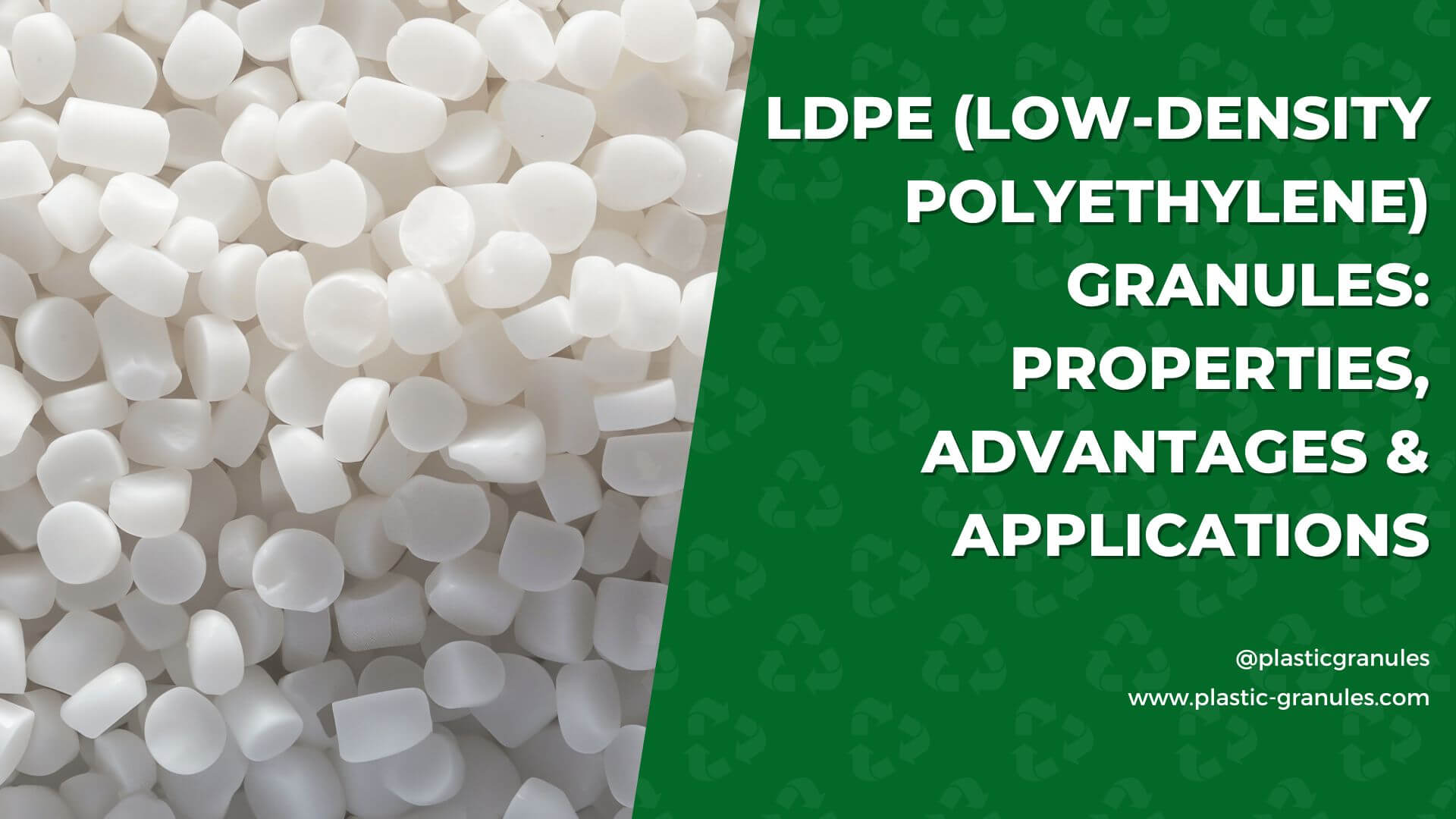Recycled plastic granules are being increasingly used in modern-day industrial practices as an alternative, sustainable solution for varied production needs. The granules are produced from discarded plastic, thereby negating the need for producing new plastic and its implications on the environment. Technically speaking, reprocessed LD granules to contribute to the circular economy by making use of those waste plastics that would otherwise be littering the environment.
Sustainability has become one of the top concerns of plastic manufacturers who want to reduce their carbon footprints without compromising on regulatory norms. Through reprocessed granules, industries can participate actively in environmentally-friendly initiatives while keeping intact product quality and performance properties. Read on to understand some major advantages, challenges, and market trends likely to influence the landscape of Plastic Granule Manufacturers in Ahmedabad.

What Are Recycled Plastic Granules?
Recycled plastic granules are produced from the plastic waste that is collected, processed, and then reformed into usable granules. These recycled granules become a sustainable substitute for virgin plastic that can be used in the packaging, automotive and construction industry. PP Granules Manufacturer in India do their bit to convert what could have been waste into wealth and useable products reducing environmental impact without undermining the expected product pact of any manufacturer.
The most common sources of recycled plastic granules are post-consumer plastics like bottles (all kinds), containers and packing material etc., as well as the industrial scrapes of plastic usage. Hence HD Granules Manufacturer in India, LDPE (Low-Density Polyethylene), HDPE (High-Density Polyethylene) & PP (Polypropylene) are few most popularly recycled plastics these days with them SRP Polymers respectively manufacturers LD Granules Manufacturer in India & PP to act as Eco-friendly Solutions becomes a high-in-demand business..
Benefits of Using Recycled Plastic Granules
Environmental Benefits
One of the most persuasive reasons to make use of recycled plastic granules is the substantial environmental benefits that they bring. With the world increasingly drowning in plastic waste, recycling has become a crucial weapon in reducing further environmental damage. The main environmental benefits include:
- Reduction in plastic waste: Industries, by recycling used plastics into reprocessed granules, also help divert plastic waste from landfills and oceans. This leads to cleaner surroundings.
- Lower carbon footprint: The manufacturing of virgin plastics is an energy-intensive process. Conversely, the production of reprocessed LD Granules Manufacturer in India and PP granules uses lesser energy, thus emitting lower carbon.
- Conservation of natural resources: Recycling reduces the need for raw materials such as petroleum, saving resources that would be used in creating virgin plastics.
- Support for the circular economy: Recycled plastic pellets are an embodiment of the circular economy as it uses an item over and over again instead of throwing it away. It’s a closed loop for plastic waste.
Cost-Effectiveness
For businesses, there are also many cost benefits to be had by switching to recycled plastic granules:
- Reduced production costs: Recycled materials are generally cheaper than virgin plastics, meaning overall production costs for manufacturers will be lower. This is especially useful for businesses working in the packaging, automotive and construction industries.
- Economic benefits for eco-friendly practices: Companies opting to use Reprocessed LD Granules derive advantage not only by way of cost reduction but such companies also enhance their brand image as an eco-friendly organization, which helps them attract customers and partners who are looking for environment-friendly solutions.
Versatility
The wide range of applications that recycled plastic granules can be used for means that manufacturers can enjoy versatility in a number of industries. Some of the essential industries reaping the benefits from recycled granules are:
- Packaging: Plastic films, bags and containers are made by LLDPE granules and PP granules.
- Automotive : Durable parts like bumpers, trims, dashboards are manufactured using recycled granules.
- Construction: Pipes, insulating materials and other construction site articles contains HD granules and LD granules.
Due to this property the reprocessed LD granules, HD GRANULES and PP granules are used as an alternative for virgin plastics in many of the applications as described below.
Compliance with Global Sustainability Standards
In today’s increasingly stringent regulatory environment, several governments and sectors are introducing more stringent norms related to the use of plastics. Manufacturers can leverage this advantage by using recycled plastic granules, as it will help them meet environmental norms mandated by governments. Some of the specific regulatory and compliance advantages includes,
- Compliance with environmental legislation: Customers become better equipped to achieve sustainability targets mandated by government laws when they procure their product from us after they start using reprocessed HDPE granules & LLDPE granules
- Align with global sustainability goals: The use of recycled plastic granules helps businesses to align with global initiatives in reducing plastic waste and encouraging sustainable manufacturing.
This helps companies to not only be compliant but also strengthens their brand in terms of being sustainable.
Challenges in Using Recycled Plastic Granules
There are a number of challenges when using recycled plastic granules that can affect their use and application, it is important for companies who wish to use recycled material to be aware of these.
Quality & Consistency
One of the main problems is that there is a high variability in the material properties. Recycled plastic granules often have some sort of variation when compared with virgin granules and this variation could impact the quality and performance of your product on an overall basis, hence making it difficult for you to get to the standards you expect.
Contamination Issues
Another important issue is contamination. Since the recycled plastics can contain impurities from previous use, the material quality might be affected. This implies that the recycling plants must have both cleaning and sorting steps able to guarantee granules of adequate quality.
Processing Difficulties
One of the main challenges in recycling is the fact that material will often degrade during the process. The repeated heating and cooling cycles that are involved with many types of mechanical recycling can cause the plastic to become weaker, which can make it more difficult to mold or process into new products. Additionally, this can also cause defects or inconsistencies if used for part production.
Supply Chain Constraints
Lastly, there are constraints stemming from the supply chain. The availability of high-quality recycled granules can be scarce and sourcing them can be difficult, which can impact production timelines and cost efficiency. Hence it is important to have a reliable supply chain.
Addressing these challenges will require the implementation of a strong quality control, improvements in recycling technology and development of efficient supply chain.
Current Trends in the Recycled Plastic Granules Market
Increased Adoption by Major Industries
The use of recycled plastic granules has witnessed a strong uptake in a number of industry verticals; packaging, construction and automotive being the most opportunistic ones. Recognizing the potential environmental benefits and economic advantages associated with the use of recycled materials for production, these industries are progressively adopting practices wherein products are made up of recycled granules. Packaging purposes alone have multiple products including bottles, containers and films that can be manufactured from recycled granules, thereby restraining the voluminous usage of virgin plastics.
Construction sector utilizes recycled plastic in building insulations, tiles or pipes; with this each type of construction redirected to sustainable construction principles contributing towards conservation as well as reducing landfill waste. Similarly, automotive sector includes manufacturers replacing their parts or components from polyurethane foams like dashboards or bumpers respectively with those made out of recycle plastics for bolstering vehicle’s eco-friendliness.
Technological Advancements
Technological breakthroughs have been at the forefront in improving the quality and efficiency of recycled plastic granules. Newer recycling technologies such as chemical recycling and improved sorting technology have helped to produce better quality granules. Chemical recycling uses a process that breaks down plastics into their respective original monomers which can then be used to develop new polymers with similar properties as virgin plastics3.
With growing advancements in this technology, granules produced through chemical recycling have potential to become identical to virgin granules. Similarly, sorting technologies using AI algorithms and advanced filtration helps to improve the decontamination process by removing contamination leading to purer recycled granules5.
Growing Government Regulations and Support
Governments all over the world are increasingly making regulations and taking steps to promote use of recycled plastics and reducing plastic waste. For example, plastic bans, extended producer responsibility (EPR) programs, recycling mandates etc., are pushing industries to adopt use of recycled materials. Many countries have set targets to include recycled content in packaging and products and provide financial incentives / subsidies for using recycled granules. Numbers of such regulatory supports would also continue growing in the coming year supporting growth of the recycled plastics market.
Circular Economy Initiatives
Circular economy is a concept that many companies are starting to adopt, meaning getting to the point of zero waste. This involves designing products for easy recycling, improving the recycling process, and incorporating recycled materials into new products. The goal is to reduce waste by keeping products in use longer. This type of sustainability can help make you more competitive in an increasingly environmentally aware market.
Sustainability Certifications
Sustainability certifications and labels are increasingly common, giving companies a means to prove their use of recycled content. Certifications like Cradle to Cradle, Global Recycled Standard (GRS), and Recycled Claim Standard (RCS) verify the inclusion of recycled content as well as supply chain transparency. These certifications empower consumers and businesses alike with knowledge and incentivize the proliferation of recycled plastic pellets.
Future Outlook for Recycled Plastic Granules
Predictions for Growth in Demand and Adoption
The future of recycled plastic granules seems bright with the expected growth in demand and adoption. With the increasing awareness about environmental issues, it is anticipated that more industries will start using recycled materials in their products.
Key factors driving this growth include:
- Consumer Demand: Increasing inclination towards sustainable products.
- Regulations: More stringent legislation and recycling targets demanding increased recycled content.
- Circular Economy: Transition to zero-waste production systems.
These trends indicate that the demand for recycled plastic granules is likely to witness significant growth across industries.
Recycling Technology Ideas That Could Reshape Waste Systems
The quality and efficiency of recycled plastic granules could be altered significantly with several new recycling technologies.
Key Innovations:
- Chemical Recycling: Dissolves difficult plastics into high-grade raw materials.
- Enzymatic Recycling: It uses enzymes that help in degrading plastics effectively.
- AI-Based Sorting: Improves sorting accuracy and speed.
The result will be more flexible – and broader – use of recycled plastics across a wide variety of applications.
Conclusion
Recycled plastic granules have a lot of environment-friendly attributes. They are low in cost and can be used across various industries. Recycled plastic granules help in reducing plastic waste, minimising carbon footprints and encouraging circular economy but certain hurdles such as quality variations, impurities and supply chain issues to be taken care of.
The present scenario says that the growing adoption among various industries, advancement in technology, increasing government support, and emergence of sustainability certification will indeed foster the demand for recycled plastic granules market in upcoming years but along with this more new manufacturers will also be entering into regional as well as international markets thus creating high competition.
Consumption of recycled plastic granules material is not just a responsibility towards environment but it can also prove to be an advantage for end use companies who are putting their step forward in terms of adopting new innovative technologies. As technology proceeds and more and more consumers demand for biodegradable solutions the sale of recycled plastic materials will hike further, thereby gradually taking up a prominent role worldwide.
To conclude, the future scope for recycled plastic granules seems to be really high as if we adopt these materials for our use, then definitely a more sustainable and resourceful world can be created which is beneficial for industries as well as environment.
FAQs
What are the main applications of recycled plastic granules?
Recycled plastic granules are used in a wide array of applications. In packaging, they are used for making bottles, containers and films. Construction also benefits from the use of recycled granules in insulation, tiles and pipes. The automotive industry uses them for parts such as dashboards and bumpers. Recycled granules can be found in all kinds of consumer products too, including furniture and household goods – testament to their versatility.
How can we ensure quality of recycled plastic granules?
Quality of recycled plastic granules can be ensured if the businesses source from a reliable supplier and check the quality of input materials. To remove contaminants, businesses should adopt advanced sorting technologies like AI based systems. Regular quality control steps including testing the granules for consistency and performance is very important. Further, businesses should also invest in better recycling technologies which will help produce higher-quality granules.
What are the main environmental benefits of using recycled plastic?
The main environmental benefits of using recycled plastic are that you are helping to dramatically reduce plastic waste, which in turn reduces landfill and ocean pollution. Recycled plastics generally have a lower carbon footprint as they use less energy to process than virgin materials do. You are also conserving natural resources as there is less need for new raw materials and promoting the circular economy by encouraging recycling and reusing materials, therefore minimizing impact on the planet.
How does recycled plastic impact product pricing?
Recycled plastic can impact product pricing in a number of ways. It often reduces material costs as, generally speaking, recycled granules are cheaper than virgin plastics. In addition to this, there may be economic incentives or subsidies available to companies for using recycled materials. The cost of recycled plastic also varies with availability and quality and so there may be an element of price volatility introduced.
What future trends businesses should watch for recycled plastics?
There are several future trends businesses should watch for recycled plastics. Technological advancements, including chemical recycling and AI-driven sorting, will improve the quality and efficiency of recycled materials. Recycled plastics will be adopted across industries more widely. Government regulations will become stricter to promote recycled content and sustainability. Businesses are increasingly engaging in circular economy and zero-waste production practice, while sustainability certifications are gaining popularity.



